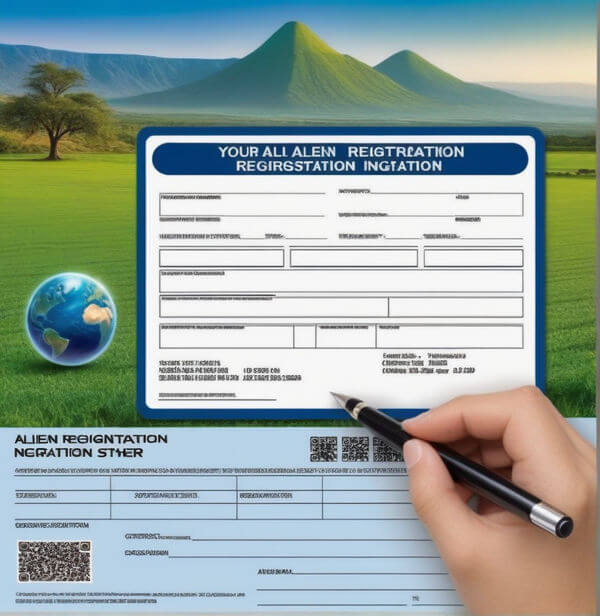
Once you've submitted your initial green card application, you will need to include your Alien Registration Number on all subsequent forms or petitions submitted to U.S. Citizenship and Immigration Services (USCIS). This number, also known as an "A-number," "A#," or "USCIS number," serves as a unique identifier throughout the immigration process. It's important to keep this number handy, as it will be required for all your interactions with USCIS moving forward.
What Exactly Is an Alien Registration Number?
An Alien Registration Number serves as a unique identification code assigned to non-citizens by the U.S. government. This distinctive sequence of digits is provided to immigrants upon their entry into the system, becoming a lifelong identifier. Its primary purpose is to facilitate the U.S. government's management and tracking of various immigration-related documents and petitions an individual may submit throughout their time in the country.
Who Is Issued an Alien Registration Number?
Alien Registration Numbers are allocated to each individual applying for a green card, whether their eligibility is based on family connections, employment, refugee status, or asylum. Essentially, this number is provided to all immigrants, defined as those planning to reside permanently in the United States. However, most non-U.S. citizens who are in the country on a temporary basis, like those with business or tourist visas, do not receive an Alien Registration Number, as they are considered short-term visitors rather than permanent settlers. An interesting exception exists for individuals on F-1 student visas who obtain work authorization; they are assigned an Alien Registration Number even without applying for permanent residency. This practice raises questions about why these student visa holders are treated differently from other temporary foreign workers. The rationale behind such decisions remains elusive, highlighting the idiosyncrasies within the U.S. immigration framework.
When Will I Receive an Alien Registration Number?
Typically, you are assigned an Alien Registration Number at the point of applying for a green card. But if you have already received work authorization in the United States under an F-1 student visa, especially by enrolling in the Optional Practical Training (OPT) program after graduation, you might already have an A-number. For individuals pursuing a marriage-based green card from within the U.S., your Alien Registration Number will be detailed on the receipt notice from USCIS following the submission of your green card application. Specifically, if you are married to a U.S. citizen, you'll file the I-485 form (Application to Register Permanent Residence or Adjust Status) immediately, receiving your A-number approximately 30 days after initiating the application process. Conversely, spouses of green card holders must wait for the approval of their I-130 petition (Petition for Alien Relative) and the availability of an immigrant visa before filing the I-485, which means acquiring an A-number might take up to a year. For those applying from outside the United States, the Alien Registration Number is allocated during the consular interview at a U.S. consulate. Regardless of your spouse's citizenship status, you'll be handed documents containing your A-number at this interview. This number is also found in the visa stamped into your passport by the consulate.
Where Is My Alien Registration Number Located?
Your Alien Registration Number becomes readily visible on all documents dispatched to you by the USCIS following your green card application. This includes the initial notification confirming receipt of your application. Further, any approval notifications and, broadly, all official communications from USCIS will feature your Alien Registration Number. On the majority of documents from USCIS, look for the “A#” label, which is usually positioned prominently at the top of the first page. For applicants outside the United States, the A-number is included on the Immigrant Data Summary and the USCIS Immigrant Fee handout provided during your consular interview. Additionally, once your application receives approval, your A-number will be present on the visa imprinted in your passport. Upon receipt of your physical green card, you will find your Alien Registration Number (marked as “USCIS#”) displayed on both the front and back of the card.
What Should I Do If I Can't Find My Alien Registration Number?
In the event that you misplace your Alien Registration Number and are unable to locate it on any USCIS documents, visas, or related paperwork, you have the option to request a copy of your immigration file through the Freedom of Information Act (FOIA) process, which will contain your A-number. Alternatively, you may arrange an InfoPass appointment at your nearest USCIS office for assistance. It's important to note, however, that the ability to schedule appointments oneself is being gradually eliminated, which means this service may not be accessible to all individuals seeking help.
How Do A-Numbers Differ From USCIS Case Numbers?
When you receive receipt notices from USCIS, you'll notice not just your Alien Registration Number but also a USCIS case number, or receipt number. This receipt number serves to monitor your specific application and allows you to check its status online. Essentially, the Alien Registration Number is allocated to you as an individual, whereas each application you submit is given a unique USCIS case number. For instance, if you file for a green card now and later apply for U.S. citizenship, each of these applications will be assigned different USCIS case numbers, but your personal A-number will remain unchanged throughout. You can distinguish between your A-number and your USCIS case number by their formats: A-numbers consist of 7, 8, or 9 digits, while USCIS case numbers are 13-character codes starting with three letters (e.g., "MSC" or "EAC") followed by ten digits. It's worth noting that the term "USCIS number" or "USCIS#" can sometimes refer to your Alien Registration Number without the word "case," which can be confusing. Always ensure you're using the correct number for your needs!
What's the Difference Between an Alien Registration Number and a Social Security Number?
An Alien Registration Number is distinct from a Social Security Number (SSN). While the former is a unique identifier used by U.S. Citizenship and Immigration Services for immigrants, the latter is employed by the Internal Revenue Service and the Social Security Administration to monitor U.S. workers' earnings, taxes, and entitlements to benefits. It's possible to apply for a SSN concurrently with a work permit during the green card application process.

